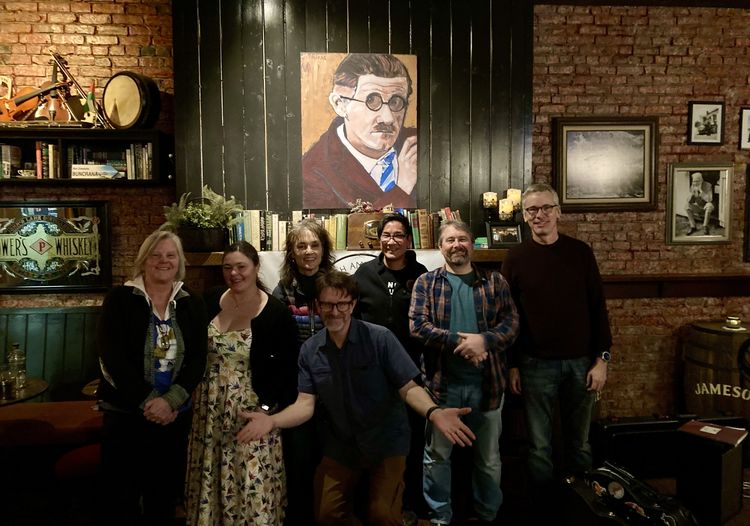Anne Enright (c) Hugh Chaloner
The multiple-awarding winning novelist Anne Enright was named in January to the new official position of laureate for Irish fiction. PHOTO: HUGH CHALONER
By Orla O’Sullivan
letters@irishecho.com
“You’re a different person every time you sit down to write,” said Anne Enright, Ireland’s first laureate for Irish fiction. “It’s always about, ‘What’s life asking me now?’”
The question behind her latest novel, “The Green Road,” is “Why are selfish people unhappy?” said the author known to many for “The Gathering,” her sixth novel, which won the Man Booker Prize in 2007.
It is subtly posed in a story that starts and effectively ends in West Clare, when Rosaleen Madigan summons her far-flung adult children to announce that she is selling the family home. The four have little in common besides an understanding of how impossible their mother is. One chapter opens: “Rosaleen told [daughter] Constance she did not want a [Christmas] present this year. She said it in a faint voice, meaning she would be dead soon so what was the point?"
No, Rosaleen isn’t an archetypal Irish mother—the martyr sitting in the dark, Enright said, adding with a reference to Dublin’s largest maternity hospital, “There isn’t a mind-melding machine in Holles Street to become an Irish mammy.”
The questions that seem of least interest to Enright are those from journalists, on whom she passed several comments during our meeting in a Dublin cafe. Between the new book and the laureate role she has been doing many interviews and giving many speeches, she said, adding that she has learned to ad lib, instead of spending three days writing each speech.
Yes, it’s true that she began writing after a nervous breakdown in her late 20s, said Enright, now 52, “… but if I knew I was going to be talking to so many journalists I wouldn’t have mentioned it. I’m just really bored with it.”
So what is her most hated question? “It isn’t so much a hated question but I’m intrigued at how interested the media is in general with success and failure. Or if you base your fiction on real people.”
The laureate appointment was announced by Taoiseach Enda Kenny at an Arts Council ceremony in January. He said: “Anne Enright’s eloquent and powerful writing, fiercely individual voice and unyielding commitment to her craft combined to make her the pre-eminent choice.
The novelist herself has described the role as “half a job, half an honor.” She will serve for three years and receive an annual stipend of €50,000 from the Art Council.
“Enda Kenny said it’s an ambassadorial role,” Enright said, adding, however, that “Irish writers are not expected to be well behaved or to perform.”
Irish readers, meanwhile, she said, are both proud of Irish writers and have “a complicated relationship” with them. “They say, ‘I knew your sister,’ or ‘I wish you’d stop writing about this and write about that.’” (Her former local paper the Bray People, once ran a sweetly proprietorial headline that said merely “Anne shortlisted for Man Booker Prize.”)
Ireland’s literary ambassador is concerned about digital publishing, particularly diminishing concentration spans. “The number of people who’ve told me ‘Oh, I have your book on my nightstand.’ I know what that means, they’re on their iPhones.”
In accepting the laureate title, Enright said it was about future writers, “who will each play a briefly emblematic role in the history of Irish letters.” Just she and her family knew last Christmas that she would be Ireland’s first laureate for fiction, which made, she said, for “a very nice Christmas. It’s nice to be first.”
Enright is married to a theatre director, Martin Murphy, and has two children, one of whom was sitting the Junior Cert exams the week we met. She herself is the youngest of five and grew up in Terenure, in South Dublin, believing from early on that she would be a writer.
“I forgot you have to actually write a book,” Enright said, adding that she was not prepared for how hard it would be. She wrote her first, a collection of short stories called “The Portable Virgin,” on weekends while working weekdays as a television producer. She was then producing children’s television for RTE, where she had previously produced an experimental arts/comedy show called “Nighthawks.”
Motherhood made writing easier, Enright said, allowing her to go from being “hugely anxious” about writing to now finding it a “source of great pleasure.” Any tendency to be precious was offset by “bills to pay” and the fact that “Books aren’t the most important thing anymore; the most important thing is right there in front of you.
“As a writer you just make things up. I sort of know now that I can make it up.”
The creation of one of characters in “The Green Road” seems prescient in that he is a gay Irish man getting married—and the book came out in May, the month that Ireland made history by becoming the first country to legalize same-sex marriage by referendum.
Enright began creating him three years ago. Dan abandoned the priesthood for New York’s East Village--very convincingly rendered although Enright has never lived in New York.
She will be in the Village next spring to teach at New York University as part of her laureate brief. “I’m trying to sort out where we’re going to live and where the kids will go to school. You have to sign your lease and then apply for schools,” she said.
Improvising is surely second nature for someone who says she starts novels without a structure in mind. And the conversation detours into perhaps a preview of her course at NYU while Enright generously offers advice: “What’s your problem with structure? If you’ve a problem with structure you write and you revise. When Beethoven sat down to write his Fifth Symphony he didn’t have it all in his head. The only thing that matters is the sentence on the page.”









